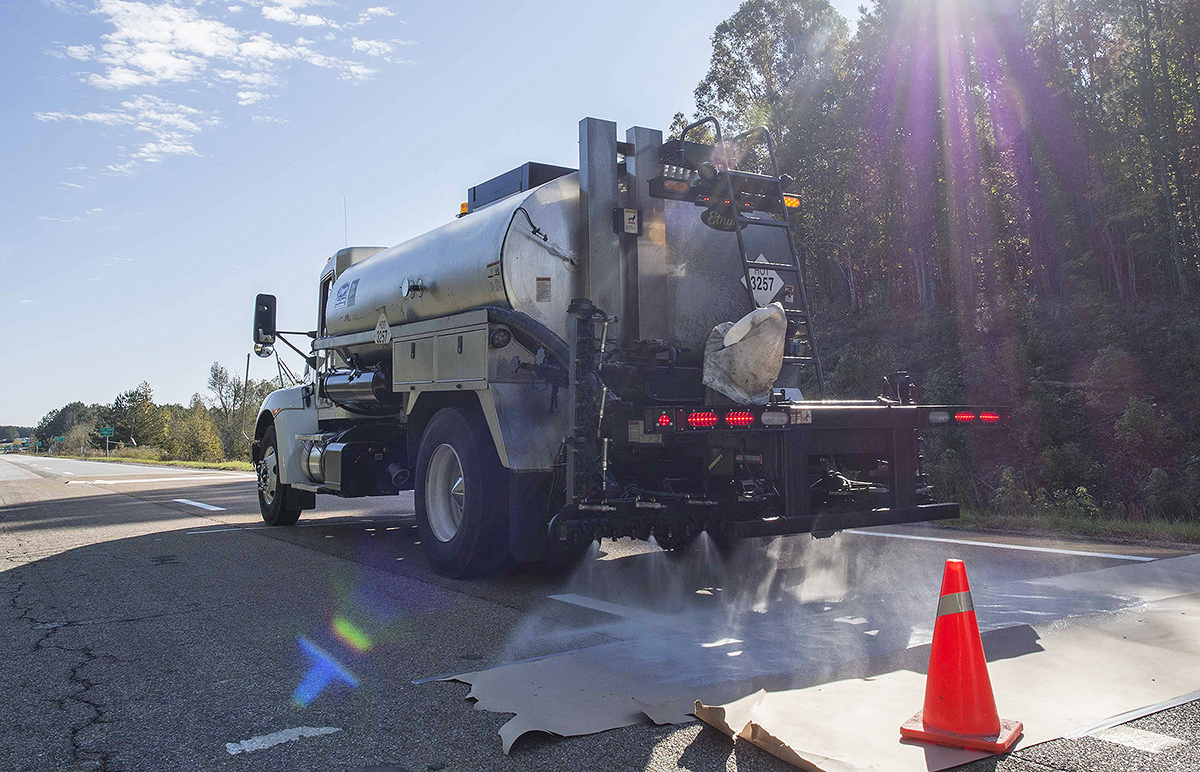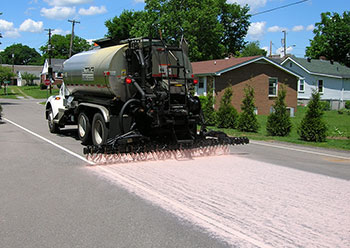
Etnyre Centennial Black Topper sprays Delta Mist bio-based rejuvenator at a rate of 0.10 gal. per sq. yd. and temperature of 50 deg F on Section S03 of the NCAT Test Track in November 2018.
IMAGE CREDIT: Christine Hall, NCAT
Rejuvenating seals are a low-cost option for preventing or retarding the surface deterioration of pavements, practical in use since they do not require specialized equipment, and can be effective for restoring the surface condition of an existing pavement, reports the National Center for Asphalt Technology (NCAT).
Rejuvenators are petroleum or bio-based oils with chemical and physical characteristics selected to restore properties of the aged asphalt binder in the surface layer. Adding a rejuvenator to a fog seal reduces the likelihood of cohesive failure within the asphalt binder film and can slow the rate of aging caused by oxidation. For optimal restoration of the aged asphalt binder, consideration should be given to the chemical composition of the rejuvenator rather than just its capacity to reduce the viscosity of the aged binder. Furthermore, the degree of diffusion of the rejuvenator into the aged binder is of utmost importance since it allows chemical changes to take place that affect the physical properties.
Rejuvenating applications should be used on mid-to-higher PCI asphalt pavements that are structurally sound. They also can be effective on aged chip seals, encouraging chip retention by slightly softening the binder and resetting the chip. They are very effective for pavement shoulder preservation. They should not be used on pavements with moderately or severely distressed surfaces, pavements with poor skid resistance or rutting, or roads that cannot be closed or partly closed to traffic during the curing period. Care in the application is required to prevent loss of skid resistance.

Reclamite petroleum-based rejuvenator is placed on residential street on pavement in appropriate condition.
IMAGE CREDIT: Tricor Refining
Rejuvenating applications may also be used to rejuvenate good quality RAP millings for base placement, or for a final ride surface for
lower volume rural, residential or regional road applications. They can be a good choice for this purpose, as they don’t over-asphalt the existing RAP binder, manufacturers say.
An important factor when considering rejuvenating fog seals is the fact that these products will immediately decrease the skid resistance of the pavement. Rejuvenating seals should be selected as a treatment for pavements that have age related distresses associated with stiffening of the asphalt binder. The curing time of a rejuvenating fog seal product, and its effect on friction, is influenced by the application rate, the existing pavement surface condition, and weather conditions at the time of the application. Therefore, traffic control and temporary reduced speed limits are often necessary after application for safety and to protect the integrity of the applied treatment.
